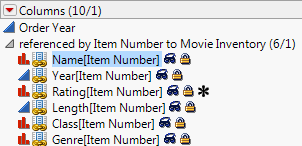Virtual Join links a main data table to one or more auxiliary data tables. The feature enables the main data table to access data from the auxiliary data tables without physically joining the tables. See “虚拟连接数据表” in the Using JMP book for details.
dt2:Choice1 << Set Property( "Link Reference", Reference Table( "$SAMPLE_DATA/Pizza Profiles.jmp" ) );
dt2:Choice2 << Set Property( "Link Reference", Reference Table( "$SAMPLE_DATA/Pizza Profiles.jmp" ) );
dt2:Choice << Set Property( "Link Reference", Reference Table( "$SAMPLE_DATA/Pizza Profiles.jmp" ) );
The Columns panel in a data table shows you the names of the linked columns. For example, open the Movie Inventory.jmp and Movie Rentals.jmp sample data tables to see the linked columns shown in 图 9.7. By default, the name of the Link ID column is in square brackets.
The default column names show how the column is linked. The column name of the source column is followed by the name of the referencing column in brackets. For example, 图 9.7 shows the Name source column followed by the referencing column [Item Number] in brackets.
You change the name of the virtually linked column name with Set Name, just like you change the name of other columns. The difference is that you need to refer to the virtually linked column by its full referencing name (referencing path). For example, the following statement changes the name of the virtually linked column Rating[Item Number] to Movie Rating.
You can also specify that the referenced column name be used in linked columns. This option lets you define a shorter column name (for example, Rating instead of Rating[Item Number]). Include the Use Linked Column Name option:
Now, when a virtually linked column is created, the default name is the name of the source column (that is, Name instead of Name[Item Number]).
